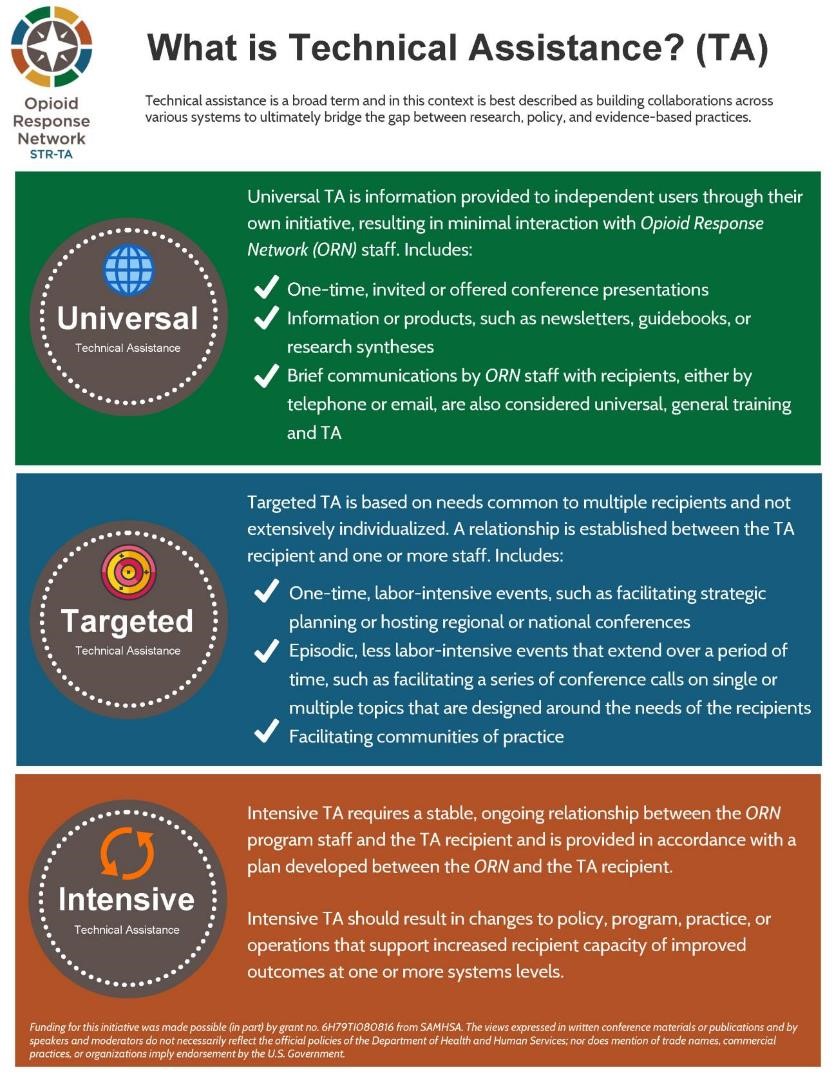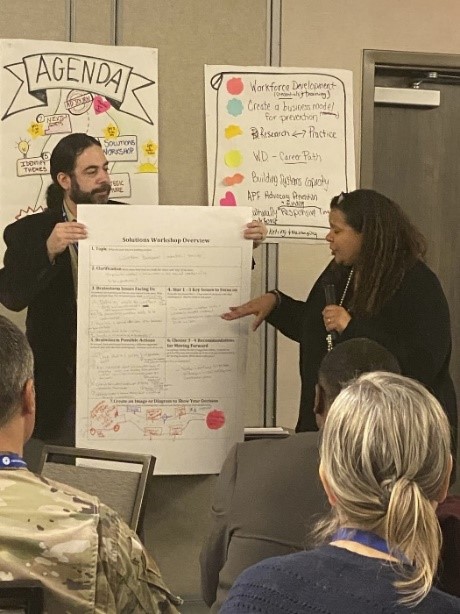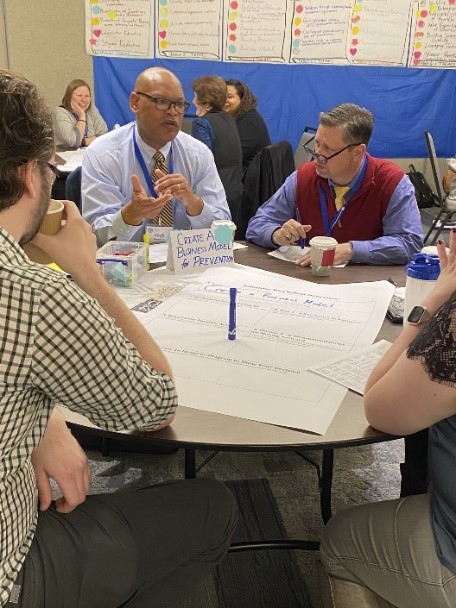Home > PTTC Post Article - February 2021
By Michele Baker
Project Coordinator, Opioid Response Network
 Overview of ORN
Overview of ORNThe Opioid Response Network (ORN) formed in 2018 in response to the national opioid epidemic and is funded by the Substance Abuse and Mental Health Services Administration (SAMHSA) through grants awarded to the American Academy of Addiction Psychiatry (AAAP). ORN is led by AAAP in collaboration with the Addiction Technology Transfer Centers (ATTC), the Columbia University Division on Substance Use Disorders and 40 national professional organizations representing over two million constituents. The Network provides free education, training, mentoring and other forms of evidence-based technical assistance (TA) to all U.S. states and territories.
 ORN’s TA system is built upon the structure of the ATTC which is modelled after the U.S Department of Health and Human Services’ 10 regional offices and a central office to coordinate national efforts. Each state and territory are assigned a local team of consultants led by a regional Technology Transfer Specialist (TTS). Technology Transfer Specialists are specialized in the implementation of evidence-based practices and respond to a range of basic and complex TA requests that target prevention, treatment, and recovery of opioid use disorders (OUD) and stimulant use disorders. ORN and its partners also follow a set of guiding principles, one of which is to “provide developmentally and culturally appropriate prevention, treatment and recovery.” Hence, a critical component to the processing of a TA request is tailoring the assistance to the unique needs of unique or hard-to-reach populations.
ORN’s TA system is built upon the structure of the ATTC which is modelled after the U.S Department of Health and Human Services’ 10 regional offices and a central office to coordinate national efforts. Each state and territory are assigned a local team of consultants led by a regional Technology Transfer Specialist (TTS). Technology Transfer Specialists are specialized in the implementation of evidence-based practices and respond to a range of basic and complex TA requests that target prevention, treatment, and recovery of opioid use disorders (OUD) and stimulant use disorders. ORN and its partners also follow a set of guiding principles, one of which is to “provide developmentally and culturally appropriate prevention, treatment and recovery.” Hence, a critical component to the processing of a TA request is tailoring the assistance to the unique needs of unique or hard-to-reach populations.
ORN is available to states, cities, organizations, and individuals located within the U.S and its territories. All are welcome to visit www.opioidresponsenetwork.org to submit a TA request and receive personalized assistance and educational resources, completely free of cost. Within 24 business hours of submitting a TA request form, a TTS will respond to the requester.
Central to the work of ORN is the prevention of the use and misuse of opioids, stimulants, and other substances. To address this priority, the network also leads efforts to advance the prevention field.
 In January 2020, ORN collaborated with its key prevention partners to hold a Prevention Thought Leaders Meeting. This two-day meeting served as an opportunity for prevention professionals to share their insights and expertise as it pertains to the relationship between the prevention field and the growing opioid epidemic. Forty-seven prevention professionals from across the U.S. and U.S. territories convened in Phoenix, Arizona to address the opportunities and challenges facing the field. Attendees also included representatives of key ORN prevention partners including the National Prevention Network (NPN), the Community Anti-Drug Coalitions of America (CADCA) leadership team and National Advisory Board and the Prevention Technology Transfer Center (PTTC) Network. The group employed brainstorming, analysis, and problem-solving activities to address the following meeting objectives:
In January 2020, ORN collaborated with its key prevention partners to hold a Prevention Thought Leaders Meeting. This two-day meeting served as an opportunity for prevention professionals to share their insights and expertise as it pertains to the relationship between the prevention field and the growing opioid epidemic. Forty-seven prevention professionals from across the U.S. and U.S. territories convened in Phoenix, Arizona to address the opportunities and challenges facing the field. Attendees also included representatives of key ORN prevention partners including the National Prevention Network (NPN), the Community Anti-Drug Coalitions of America (CADCA) leadership team and National Advisory Board and the Prevention Technology Transfer Center (PTTC) Network. The group employed brainstorming, analysis, and problem-solving activities to address the following meeting objectives:
 Following a series of consensus methods, the following goals and opportunities emerged:
Following a series of consensus methods, the following goals and opportunities emerged:
A path towards addressing these themes began to form as the ORN Leadership team and its key prevention partners outlined goals and actions steps in a Proceedings Report and established the Prevention Stakeholder Committee to further facilitate a collaborative approach.
 The COVID-19 pandemic has impacted everyone in some manner. Educators, students, and parents are among those who have had to quickly adapt to sudden changes induced by this global outbreak. For their safety, communities, children, educators, and parents have had to embrace an abrupt shift to remote and hybrid learning. Simultaneously, the opioid epidemic continues to devastate communities across the country. In the face of this challenging period, prevention and early intervention remain a priority.
The COVID-19 pandemic has impacted everyone in some manner. Educators, students, and parents are among those who have had to quickly adapt to sudden changes induced by this global outbreak. For their safety, communities, children, educators, and parents have had to embrace an abrupt shift to remote and hybrid learning. Simultaneously, the opioid epidemic continues to devastate communities across the country. In the face of this challenging period, prevention and early intervention remain a priority.
The Cross-Technology Transfer Center (TTC) Workgroup on Virtual Learning (2021) found that Technology Transfer Centers (TTCs) across the U.S. have also had to employ strategies to adapt the once common face-to-face delivery of TA. Some of the strategies employed to adapt to remote TA delivery include live streaming, podcasts, and webinars.
In November and December of 2020, the ORN hosted a three-part webinar series addressing challenges and opportunities to address youth substance use prevention and resilience during and after school. These sessions provided educators, counsellors, and prevention specialists with innovative ideas for effectively adapting prevention curricula during these difficult times. The sessions addressed the following topics:
For more information, visit: https://opioidresponsenetwork.org/Education/schools.aspx
Whether it is preventing new cases of disease or preventing the progression of an existing case, prevention is key to gaining control of any epidemic. ORN is collaborating with prevention leaders to advance the prevention workforce, prepare educators in the field, and to provide technical assistance to communities across the U.S. Any person can advance their prevention efforts by submitting a TA request to ORN in order to assist in their response to OUD and stimulant use disorders prevention needs in their community. Join the ORN in fighting the opioid epidemic, by visiting www.opioidresponsenetwork.org to submit a TA request today.
 Michele Baker, CHES® serves as a Project Coordinator for the Opioid Response Network (ORN). She holds a Bachelor of Health Sciences with minors in Public Health and Chemistry from the University of Missouri-Kansas City (UMKC). During her time with UMKC, Michele also served as an Undergraduate Researcher, Epidemiology Supplemental Instructor, and Diabetes Prevention Program Facilitator. Prior to her role with the ORN, Michele has also served as a consultant for the Addiction Technology Transfer Center (ATTC) Network Coordinating Office, a member of the ORN's Leadership Team. As a Certified Health Education Specialist and Kansas Public Health Fellow, Michele strives to continually spread her passion for prevention, community health research, and education during her endless quest for growth and enlightenment.
Michele Baker, CHES® serves as a Project Coordinator for the Opioid Response Network (ORN). She holds a Bachelor of Health Sciences with minors in Public Health and Chemistry from the University of Missouri-Kansas City (UMKC). During her time with UMKC, Michele also served as an Undergraduate Researcher, Epidemiology Supplemental Instructor, and Diabetes Prevention Program Facilitator. Prior to her role with the ORN, Michele has also served as a consultant for the Addiction Technology Transfer Center (ATTC) Network Coordinating Office, a member of the ORN's Leadership Team. As a Certified Health Education Specialist and Kansas Public Health Fellow, Michele strives to continually spread her passion for prevention, community health research, and education during her endless quest for growth and enlightenment.
References
Cross-Technology Transfer Center (TTC) Workgroup on Virtual Learning. (2021). Virtual reality for behavioral health workforce development in the era of COVID-19. Journal of Substance Abuse Treatment, 121, 108157. https://doi.org/10.1016/j.jsat.2020.108157
Opioid Response Network. (2021). Proceedings Report: Prevention Thought Leaders Meeting. Retrieved from https://opioidresponsenetwork.org/Prevention.aspx
Opioid Response Network. (2021). Schools and the Opioid Epidemic in the Age of COVID-19. Retrieved from https://opioidresponsenetwork.org/Education/schools.aspx